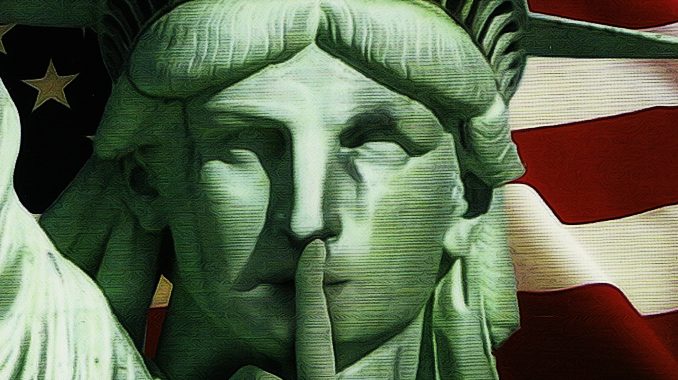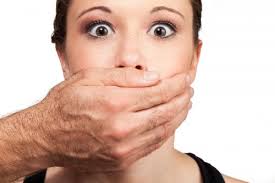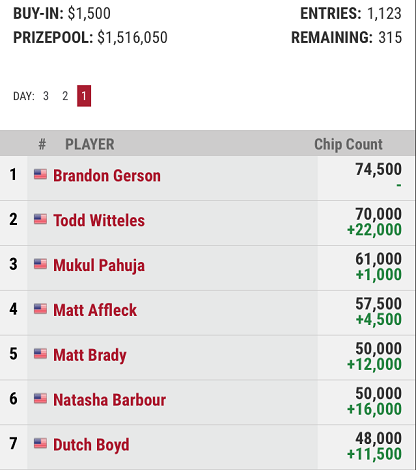
I was among a rare breed in college in the early 1990s. While most students on campus were either politically left or apolitical, I was one of the few young conservatives. I tended to agree with most Republican positions at the time, but there was one area where I found myself frequently aligned with the campus liberals: Free speech.
Free speech in the early ’90s was a bit different than today. There was little discussion or debate at the time regarding the censorship of ideas or “offensive” diatribes. Rather, free speech in those days centered upon areas such as pornography, culture, and entertainment. Many early ’90s conservatives wanted pornography curtailed, offensive programming kept off of the public airwaves, and offensive artwork being kept out of galleries. Liberals at time strongly advocated for the freedom of dissemination of such material. Despite being a conservative, I agreed with the liberals at the time. I didn’t like the idea of adults being told what cultural and entertainment products were too “offensive” for them to be allowed to enjoy.
I’ve always been a very big supporter of civil liberties. Oddly, the public perception of civil liberties is that it’s the domain of the left. If you’re a supporter of civil liberties, you are assumed to be a leftist, and if you oppose them, you are assumed to be a fascist right winger.
However, that isn’t necessarily true. The entire concept of modern American conservatism revolves around the importance of the individual. Conservatives believe that the individual should be empowered to achieve his own destiny, and then experience the consequences of his actions, whether good or bad. True conservatives want to make sure the government provides little resistance for the individual to succeed on his own merits, but also wants to appropriately punish the individual if he chooses to commit crimes. Civil liberties are an important piece of that individualism. The individual must be able to speak his mind and go about his business without the danger of being legally bullied by the government or large, well-heeled corporations. The true conservative should be a staunch supporter of civil liberties, even if the loudest civil liberties proponents have traditionally arisen from the left.
Unfortunately, conservatives of the past are somewhat to blame for the perception of their hostility towards civil liberties. While liberals in the past were correctly fighting for freedom of speech regarding the dissemination of offensive cultural and entertainment content, many conservatives took an ill-advised puritanical approach. Thus, free speech was ingrained in the public’s mind to be something the left fought to preserve, while the right were the villains opposing it.
Today’s situation, however, is quite different. An old form of censorship has arrived again in America — the censorship of ideas — and this time it’s the left who want to proceed with it full speed ahead.
It all started with the concept of “hate speech”. In an effort to curb discrimination against traditionally marginalized groups (gays, racial minorities, transsexuals, etc), the left decided that much of this discrimination sprung from hateful rhetoric aimed at these groups. The natural solution seemed to lie in silencing such hateful speech. After all, what good comes from blatant hateful speech against blacks, gays, Jews, Muslims, transsexuals, women, or any other group suffering existing discrimination? Since such speech only causes harm and does no good, the logical next step seemed to call for censoring such speech.
The censorship of this hate speech took several forms. You would be punished for engaging in it on college campuses. Your accounts on major social media sites would be closed and all of your content deleted. Your employer would be contacted and pressured into firing you. You would be shamed publicly, thus future Google searches of your name would interfere with future employment opportunities, friendships, and relationships. Some people even advocated charging these people with crimes such as “inciting violence”, even if their speech didn’t directly call for any violent acts.
On the surface, these would seem like correct consequences. If you are a blatant racist, anti-Semite, or homophobe, you need to accept society’s rejection of your archaic and hateful views. Words have consequences, and if your own words end up harming yourself in the future, then you have no one to blame but yourself.
However, as with many well-meaning actions taken to supposedly better society, there’s often that dreaded slippery slope. In this case, it involves the actual definition of hate speech. Unfortunately, such a definition is extremely subjective. Some consider hate speech only to be the obvious, blatant rants which vilify a marginalized group of people. However, many others, especially on the left, have widely expanded the definition of hate speech, often including rational disagreement of left-wing political and social viewpoints.
For example, if you state that you don’t support transgender people being able to use the bathroom of their “new” gender, many would consider that hate speech. If you state the (unfortunately true) statistic that black men commit a disproportionately high number of violent crimes in the United States, again, many would accuse you of hate speech. If you state that racial or gender based hiring quotas are unfair, once again you might be accused of hate speech. If you observe that Muslims are disproportionately committing major acts of terror in Western countries, again you could be said to be committing hate speech.
Regardless of where you stand on the above issues, these are all complex social/political debate topics with large numbers of people on both sides. However, we have reached a point in this country where, if your opinions, thoughts, or ideas are believed to possibly “offend” any marginalized group, you’re automatically deemed a bigot. In fact, if you are on the “wrong” side of any of the issues described above, many see you as evil and a danger to society, and thus your ability to express such opinions needs to be cut off.

I interact with many people on Facebook, where there exists a wide array of political opinions. I recently asked a group of leftists, several of whom I knew to be longtime civil liberties supporters, what they thought of free speech in 2018. Their responses were disheartening:
“I fully support free speech, unless that speech is hateful and seeks to bring down marginalized people,” said one.
“Free speech is important, but with the rise of Donald Trump and the hateful following he has, we must not give bigotry any kind of platform. Trump supporters should not be given the opportunity to express their hatred,” said another.
“The only way we can take this country back from its current state of darkness is to silence the voices who have darkened it. I’m usually for complete freedom of speech, but desperate times call for desperate measures,” remarked yet another.
Notice that these people did not define exactly what they meant by “bigotry”, “hatefulness”, and “darkness”. Rather, they seem to feel that if they perceive something as hateful or offensive, then it is not worthy of being heard, and therefore must be silenced. They want themselves and others like them to be the country’s new thought police. If your speech is deemed offensive, then you are not allowed to be heard.
Unfortunately, while well-meaning, these leftists don’t realize that they are advocating one of the most common tactics of fascism. It is incorrectly perceived by many that fascism is always a product of the extreme right. In reality, fascism has existed across the entire political spectrum throughout history, and is not associated with any kind of political bent. Rather, fascism seeks to establish rule by silencing and punishing the opposition, usually with a flimsy justification that the opposition represents “evil” or “a danger to society”. Fascism keeps the opposition silent by convincing the public that the opposition’s ideas are so dangerous and harmful that it’s in everyone’s best interest that they are never heard. When the opposition still attempts to speak, they are met with violent consequences, again supposedly for the good of the people.
If a lot of that sounds eerily familiar, it’s because we’re seeing it happen in the United States. Right-wing speakers are being shut out of college campuses — even public colleges — sometimes by violent left-wing groups which threaten to harm them for showing up and speaking. Many leftists are increasingly becoming open to the idea of violence being a solution to “people who promote hatred” (which can mean anyone who disagrees with them). Big Social Media in Silicon Valley has made their workplace astoundingly and openly hostile toward conservatives. If you dare allow your right wing politics to be known while working at Facebook, Twitter, or Google, your career at these companies will be effectively over, and you will face an increasingly hostile working environment until you’re shown the door. YouTube, which basically holds a monopoly on the self-made internet video market, has increasingly censored and “de-monetized” conservative content.
Worst yet, the average American liberal is becoming increasingly open to the idea of censorship of “offensive” ideas. The rabid free speech advocate liberal of the 1990s is becoming a dinosaur, on its way to complete extinction. Most have decided that “combating hatred” has become more important than free speech, despite it being the main cornerstone of freedom in our country’s history. The few remaining liberals who advocate freedom of expression are often shouted down, accused of being bigots themselves, and told that they’re part of the problem.
Of course, when confronted with their recent hostility toward free speech, many on the left will (correctly) point out the spotty record of the current leader of the right, Donald Trump. Indeed, Trump has a very thin skin, and unfortunately seems to advocate authoritarian rule. If Trump had his way, he would close down news media critical of him (even ones fairly criticizing him), and would grant himself powers to legally punish his loudest detractors. This is one of the things I dislike most about Trump. Regardless of whether you support him in general, it is important for conservatives to reject his nonsensical calls to censor left-wing news media. While I agree that some centrist-posturing media organizations are indeed unfairly biased against him (CNN is a good example), this media must be allowed to exist and publish its material.
When leftists respond to my concerns of their support of censorship by bringing up Trump, I simply tell them that I disagree with him on this issue, and that any authoritarian advocacy on his part does not excuse their own support of censorship of ideology. Or, simply put, this is really a case where two wrongs definitely don’t make a right.

It’s also important to note that modern censorship seems to mostly be the domain of the left. While Trump’s attacks on the media are foolish, as are his most ardent supporters parroting his ideas, it does not represent conservatives as a whole. You do not see right wingers attempting to shut down leftist speakers. You do not see conservatives attempting to get left-wing videos taken off the internet. You do not see large conservative-leaning companies firing or demoting employees for having liberal political viewpoints. On the whole, most conservatives want all forms of ideology to be allowed to be expressed, whereas many liberals feel that conservative ideology is “hateful” and must be suppressed.
I have also seen leftists use the excuse of, “We are still in support of the First Amendment. However, the First Amendment does not apply to what private companies allow on their websites, or what college campuses tolerate as acceptable behavior, or what corporations deem important values for their employees to possess. Everything we’re advocating, what you call ‘censorship’, does not apply to the First Amendment.”
I counter with this: The First Amendment was written in 1789. Computers did not exist then, nor did anyone have any thought of something like social media. College campuses, the few that existed, were not hotbeds of political activism. It is important to understand the spirit of the First Amendment — that the individual should have the right to freely express himself without censorship. Therefore, supporting non-government forms of censorship, such as removal of right-wing content from monopolistic social media, prevention of right-wing speakers at pubic colleges, or large corporations requiring employees to engage in monolithic political thought, is violating the spirit of the First Amendment. A true free speech advocate should never seek to silence speech he does not agree with, except in super-obvious cases such as calls for violence, illegal activity, or yelling-fire-in-a-crowded-theater type situations.
Believe it or not, this article is not meant to vilify the left. I actually believe that the pro-censorship left is largely advocating this position because they feel it will benefit marginalized people in this country. Unfortunately, this “cure” will be more harmful to the country than the hatred they’re trying to fight, and will simply cause more divisiveness and perhaps a rise of fascism in the name of “tolerance”.
Why do I believe the left is more likely to censor ideology than the right? It’s actually rather simple. The right believes that the left is wrong. The left believes that the right is evil. When you feel the opposition is simply incorrect, you don’t feel the need to suppress their viewpoints. When you feel the opposition is expressing themselves from a place of evil, you feel much more of a need to keep them quiet, for fear that the evil will become viral.
If you are an American liberal, please take some time to think about your position on free speech. Ignore Trump. In fact, forget for a moment that he exists at all. Instead, ask yourself if the freedom of expression of ideas is of extreme importance to truly have a free country. Ask yourself if fascism involves the suppression of opposing opinions under the guise of “preventing dangerous ideas from being disseminated”, and then ask yourself if you’re basically advocating the same thing. Ask yourself if a true standard for “hate speech” can really be established without being abused for political censorship purposes. Ponder the immense influence Big Social Media has on the public nowadays, and if monolithic political bias at these corporations is good for democracy.
I enjoy the fact that the internet allows us to read and watch such a diverse group of opinions about so many different subjects. I don’t like echo chambers. I read as many left-wing articles as I do right-wing articles, because I want to honestly consider each issue from all sides. It is far more intellectually challenging and rewarding to read articles expressing viewpoints you disagree with, because it allows you to take a critical look at your own opinions, and perhaps modify them if justified. It’s a lot easier to read material you already agree with, thus simply confirming existing biases. It would upset me greatly if there were ever a move to censor left-wing content from anywhere. If the right were ever to advocate this, I would be the first to stand up and call it out as wrong.
I am good friends with both far-right conservatives and far-left liberals. I do not let politics define my judgment of people’s character, and I also do not ever want to see a situation in the United States where we are force-fed the “correct” version of political and social thought.
To the political right: Please loudly reject Donald Trump’s assertions that the mainstream media needs to be put under some kind of external control. Otherwise, you are no better than the leftists attempting to censor conservative speech everywhere.
To the political left: Please loudly reject any attempts to censor so-called “hate speech”, as it is being abused as a way to simply silence the viewpoints of the opposition. Otherwise, you are no better than Trump when he wants to shut down the mainstream media.
To everyone: Living in a free speech country is a unique privilege which is still largely rare around the world, even the first world. Please appreciate it and defend it, or otherwise one day you might wake up to find your own voice silenced.




